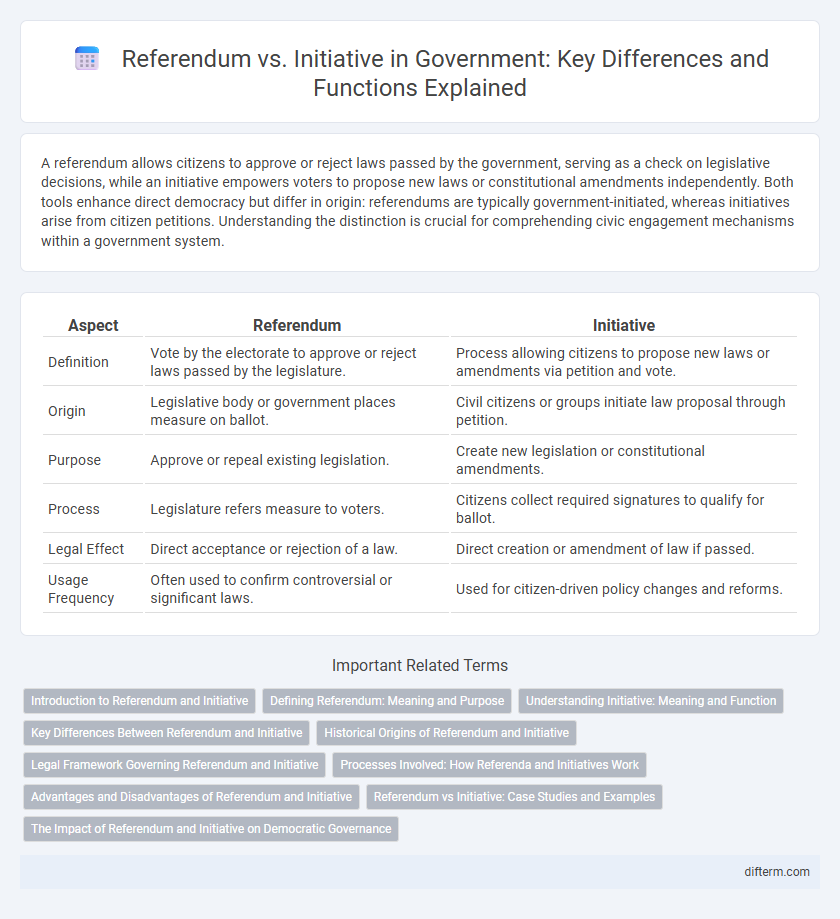A referendum allows citizens to approve or reject laws passed by the government, serving as a check on legislative decisions, while an initiative empowers voters to propose new laws or constitutional amendments independently. Both tools enhance direct democracy but differ in origin: referendums are typically government-initiated, whereas initiatives arise from citizen petitions. Understanding the distinction is crucial for comprehending civic engagement mechanisms within a government system.
Table of Comparison
| Aspect | Referendum | Initiative |
|---|---|---|
| Definition | Vote by the electorate to approve or reject laws passed by the legislature. | Process allowing citizens to propose new laws or amendments via petition and vote. |
| Origin | Legislative body or government places measure on ballot. | Civil citizens or groups initiate law proposal through petition. |
| Purpose | Approve or repeal existing legislation. | Create new legislation or constitutional amendments. |
| Process | Legislature refers measure to voters. | Citizens collect required signatures to qualify for ballot. |
| Legal Effect | Direct acceptance or rejection of a law. | Direct creation or amendment of law if passed. |
| Usage Frequency | Often used to confirm controversial or significant laws. | Used for citizen-driven policy changes and reforms. |
Introduction to Referendum and Initiative
A referendum is a direct voting process allowing citizens to approve or reject specific laws or policies proposed by the government or legislature. An initiative empowers citizens to propose new laws or constitutional amendments by gathering a required number of signatures to qualify for a public vote. Both mechanisms enhance democratic participation by involving the electorate in decision-making beyond representative government.
Defining Referendum: Meaning and Purpose
A referendum is a direct vote by the electorate on a specific legislative measure or policy issue, allowing citizens to accept or reject proposed laws or constitutional amendments. It serves as a tool for democratic participation by enabling voters to have the final say on important government decisions without relying solely on elected representatives. The primary purpose of a referendum is to legitimize significant political changes and ensure public consent in the legislative process.
Understanding Initiative: Meaning and Function
An initiative is a process that allows citizens to propose and enact new laws or amendments directly through a public vote, bypassing the legislature. It functions as a tool for direct democracy, empowering voters to shape policy on specific issues by gathering a required number of signatures to qualify for the ballot. This mechanism ensures that public concerns can lead to tangible legal changes without relying solely on elected representatives.
Key Differences Between Referendum and Initiative
Referendums allow voters to approve or reject laws or policies enacted by the legislature, serving as a form of direct democracy to confirm legislative decisions. Initiatives enable citizens to propose new laws or constitutional amendments by collecting signatures, bypassing the legislature entirely. Key differences include the origin of the measure--referendums are typically government-placed on the ballot, while initiatives are citizen-driven--and the purpose, with referendums primarily for approval or repeal, and initiatives for creation of new legislation.
Historical Origins of Referendum and Initiative
Referendums originated in ancient Rome as a tool for citizen participation in decision-making, allowing voters to approve or reject laws proposed by the government. Initiatives began in the late 19th century in the United States as a progressive reform, enabling citizens to directly propose legislation bypassing the legislature. Both mechanisms evolved to enhance democratic engagement by giving the electorate a direct voice in governance.
Legal Framework Governing Referendum and Initiative
The legal framework governing referendums and initiatives varies by jurisdiction, often codified in constitutional or statutory law that outlines eligibility, procedure, and binding effects. Referendums typically allow voters to approve or reject legislation passed by the government, while initiatives enable citizens to propose new laws or constitutional amendments through petition. Compliance with requirements such as signature thresholds, submission timelines, and judicial review ensures the legitimacy and enforceability of both mechanisms in democratic governance.
Processes Involved: How Referenda and Initiatives Work
Referenda require legislative approval to place a proposed law or constitutional amendment on the ballot for public vote, usually after the government or its agencies draft the measure. Initiatives originate from citizens who gather a required number of signatures to qualify a proposed law or constitutional amendment directly on the ballot, bypassing the legislature. Both processes empower voters to directly influence laws but differ in origin, signature requirements, and procedural steps to achieve ballot status.
Advantages and Disadvantages of Referendum and Initiative
Referendums allow voters to directly accept or reject specific legislation, providing a clear expression of public opinion but may oversimplify complex issues and be influenced by misinformation. Initiatives enable citizens to propose new laws or amendments, increasing democratic participation and addressing issues neglected by legislators, yet they can lead to costly ballot measures and potential manipulation by special interest groups. Both mechanisms enhance direct democracy but require careful regulation to balance public involvement with informed decision-making.
Referendum vs Initiative: Case Studies and Examples
Referendums and initiatives serve as direct democratic tools allowing citizens to vote on specific laws or policies, but they differ in process and application. Case studies show that Switzerland frequently uses referendums to approve or reject legislation passed by parliament, while states like California utilize initiatives to let citizens propose and enact laws independently of the legislature. Examples from these jurisdictions highlight the impact of citizen involvement on public policy, with referendums often acting as checks on government decisions and initiatives enabling grassroots legislative reforms.
The Impact of Referendum and Initiative on Democratic Governance
Referendums empower citizens to directly vote on specific policies, enhancing democratic participation and legitimacy in governance. Initiatives allow the public to propose new laws or amendments, fostering grassroots engagement and responsiveness in the political system. Both mechanisms strengthen democratic governance by increasing transparency, accountability, and citizen involvement in decision-making processes.
referendum vs initiative Infographic

 difterm.com
difterm.com